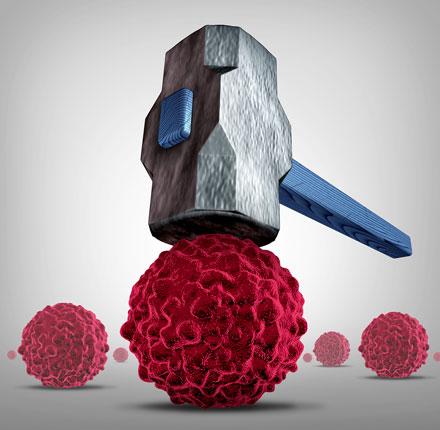You are here
Promising drugs stoke talk of eventual cancer ‘cure’
By Reuters - Jun 04,2016 - Last updated at Jun 04,2016

Photo courtesy of ceskaa.com
LOS ANGELES — Robert Waag is alive and apparently cancer free more than two years after advanced melanoma reached his lungs, hips and other parts of his body — a feat only recently considered unthinkable for such patients.
Waag, 77, is on the immunotherapy Keytruda, a new type of drug that enlists the body’s defences in the fight. The first new immunotherapy drug for cancer was introduced in 2011, so long-term efficacy is unknown. But the approach is showing promise.
Before these drugs, the prognosis for most patients with advanced melanoma was a year at best. In one study of Keytruda, 40 per cent of such patients survived at least three years, and 10 per cent showed no evidence of cancer.
“The prospect that more and more patients will be cured is becoming a reality,” said Waag’s oncologist Dr Lynn Schuchter, the chief of hematology oncology at Philadelphia’s Penn Medicine who has no current financial ties to drug companies.
After decades in which progress meant eking out weeks or months at the end of life, such treatments are changing the dialogue around cancer. Leading cancer experts are beginning to talk about the possibility that some patients will beat diagnoses once considered death sentences.
The White House calls it an “inflection point” with cancer science apparently poised for big gains. In his state of the union address in January, President Barack Obama announced a federal initiative to “cure cancer once and for all”, including up to $1 billion to boost the best ideas in prevention, early detection and treatment.
Silicon Valley innovators are joining the effort too. Napster founder Sean Parker has endowed a foundation aimed at accelerating the development of promising treatments.
For the most difficult cancers, the day that the word “cure” can be used with confidence remains a longway off, top oncologists and drug company executives said in interviews with Reuters. But as they gather Friday at the annual meeting of American Society of Clinical Oncology in Chicago, a new optimism is expected to permeate many conversations.
Talking about recent progress against melanoma, the first cancer to be targeted by immunotherapy, Dr Daniel Hayes, incoming ASCO president, summed up the cautious shift: “It makes us wonder if we can use the word ‘cure’.”
Doctors at the ASCO meeting will hear about efforts to attack the toughest cancers with immunotherapy, including another potential game changer that tweaks a patient’s own cells to become more effective cancer killers, as well as other drugs and combinations.
Merck & Co.’s Keytruda and Opdivo, a rival drug made by Bristol Myers Squibb, work by blocking a protein tumours use to evade detection by the immune system. Roche Holding AG recently received US regulatory approval for a similar drug, Tecentriq, for treating bladder cancer.
One study of Opdivo in patients with a type of advanced lung cancer found that 23 per cent were alive two years after starting the drug, compared to 8 per cent of those given standard chemotherapy.
“We are raising the bar for overall survival,” said Fouad Namouni, the head of medical research at Bristol Myers. “How can we do more? We are looking at combining immunotherapy agents.”
Researchers are also trying to determine which patients will respond best to immunotherapy and how long they need to continue treatment. In the recent Keytruda study, the melanoma in two patients got worse after their treatment was stopped.
Waag, a retired professor of engineering at New York’s University of Rochester, is wary of stopping treatment. First diagnosed in 1998, Waag’s skin lesions were surgically removed, and he was apparently disease free for 13 years. “Then it came back — and with a vengeance,” he said.
Some patients, including Waag, experience no apparent side effects. But immunotherapy drugs can cause liver inflammation and other problems linked to revving up the body’s immune system, requiring patients to stop treatment. A substantial portion of patients do not respond to the drugs at all.
For many oncologists, a real cure will be realised only after decades of follow-up study show significant numbers of patients survive with no signs of cancer. The current benchmark for patients to be considered cancer free is five years.
At around $150,000 a year, Keytruda and Opdivo are expensive. Another, still experimental, immunotherapy approach that is generating excitement could cost much more.
Chimeric antigen receptor T-cell, or CAR-T, therapies are made by extracting a patient’s immune system T cells, altering their DNA to sharpen their ability to spot and kill cancer cells, and infusing them back into the same patient.
Early studies have shown them apparently eliminating blood cancers, such as leukaemia and lymphoma, in 40 to 90 per cent of patients. But, in some cases, there were potentially life-threatening side effects.
Related Articles
AMMAN — Cancer treatment using immunotherapy drugs is now available in Jordan after being approved by the concerned authorities, giving more
COPENHAGEN — Immunotherapy brings new hope to cancer patients in Jordan and has already saved many lives, but cost remains a challenge, acco
PARIS — A woman with an aggressive form of breast cancer which defied chemotherapy and spread to other organs, was cured with an experimenta


















